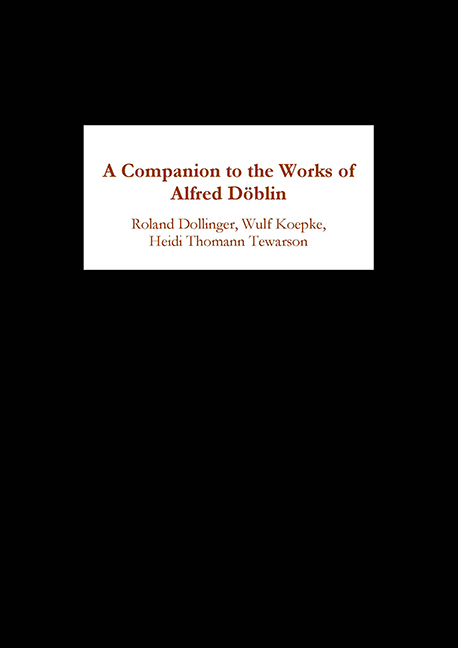Book contents
- Frontmatter
- Contents
- Foreword
- Abbreviations and Translations of Titles
- Works by Alfred Döblin
- Introduction
- Early Works
- Works of the Weimar Period
- Exile and Return to Europe
- Döblin, the Critic of Western Civilization: The Amazon Trilogy
- Döblin's November 1918
- Döblin and Judaism
- Robinson the Castaway: Döblin's Christian Faith as Reflected in His Autobiography Schicksalsreise and His Religious Dialogues Der unsterbliche Mensch and Der Kampf mit dem Engel
- The Tragedy of Truth: Döblin's Novel Hamlet oder Die lange Nacht nimmt ein Ende
- Bibliography
- Notes on the Contributors
- Index
Robinson the Castaway: Döblin's Christian Faith as Reflected in His Autobiography Schicksalsreise and His Religious Dialogues Der unsterbliche Mensch and Der Kampf mit dem Engel
from Exile and Return to Europe
Published online by Cambridge University Press: 27 April 2017
- Frontmatter
- Contents
- Foreword
- Abbreviations and Translations of Titles
- Works by Alfred Döblin
- Introduction
- Early Works
- Works of the Weimar Period
- Exile and Return to Europe
- Döblin, the Critic of Western Civilization: The Amazon Trilogy
- Döblin's November 1918
- Döblin and Judaism
- Robinson the Castaway: Döblin's Christian Faith as Reflected in His Autobiography Schicksalsreise and His Religious Dialogues Der unsterbliche Mensch and Der Kampf mit dem Engel
- The Tragedy of Truth: Döblin's Novel Hamlet oder Die lange Nacht nimmt ein Ende
- Bibliography
- Notes on the Contributors
- Index
Summary
ALFRED DÖBLIN SUBTITLED his autobiography Schicksalsreise with remarkable accuracy as “Bericht und Bekenntnis.” The book is first of all a detailed memoir of those troubled wanderings that began in May 1940 for the writer exiled in Paris since 1933. Fleeing the advancing Wehrmacht, Döblin arrived in Hollywood four months later, returning temporarily to the wreckage of postwar Germany in November 1945. Accordingly, his Robinsonade is divided into three parts, subtitled “Europa, ich muß dich lassen” (Farewell, Europe), “Amerika,” and “Wieder zurück” (Back Again). It should be noted that although the first book was written in America between 1940 and 1941, the second and third came to be only seven years later, in his homeland. While Döblin felt compelled immediately upon his arrival in California to record the events of his flight in a book called “Robinson in France,” which was based on his notes from exile and supplemented with current observations pertaining to postwar Germany, he did not finish the work until 1948. In addition to this frame of documentary reporting, in which Döblin assumes the role of a contemporary commentator, Schicksalsreise has the characteristics of a religious manifesto, and here he reveals himself openly to his readership as a devout Christian. On this level, the first-person narrator presents the ideas and processes by which his flight became a spiritual adventure, in the course of which Döblin the Jew not only came to believe in Christ as the Son of God, but also fulfilled this recognition by his formal conversion to Catholicism.
The Catastrophe
As Döblin sat at work on his novel November 1918, the pen was literally struck from his hand by the radio report on 16 May 1940 that German troops had broken through the northern flank of the 9th Division of the French army between Sedan and Namur (SR, 17). The inconceivable defeat occurred with frightening speed. Hardly any doubt as to the outcome remained. Within a few weeks, France, which after the First World War had become the strongest European military power, was overrun and faced the humiliating occupation by its German archenemy. The mortal danger in which Döblin found himself was obvious to anyone familiar with his life. He was on the most-wanted list of his German persecutors not only as a Jew who in exile had strongly advocated an independent Jewish state.
- Type
- Chapter
- Information
- A Companion to the Works of Alfred Döblin , pp. 247 - 270Publisher: Boydell & BrewerPrint publication year: 2003



